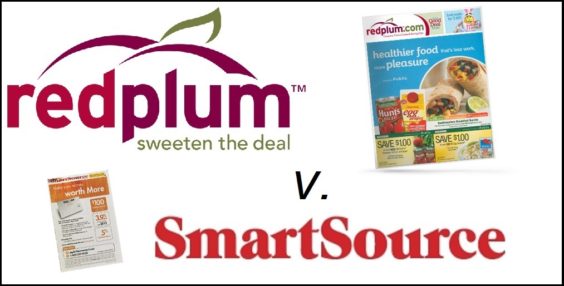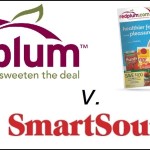
The testy relationship between the owners of the SmartSource and RedPlum coupon inserts is getting even more contentious, as SmartSource owner News America Marketing lashes out at RedPlum owner Valassis.
At issue is the lawsuit that Valassis filed last month, accusing News America of operating a virtual monopoly and using strong-arm tactics to maintain it. In its response, filed in a federal court yesterday, News America asks the court to dismiss the case, calling it “a transparent attempt to re-litigate old, and settled, disputes.” It also accuses Valassis of using the suit to make it more attractive to potential buyers – like Harland Clarke Holdings Corp., which announced earlier this week that it would be acquiring Valassis for $1.84 billion.
News America and Valassis have been down this road before – Valassis won a $300 million judgement against News America in 2009, and eventually settled that and another lawsuit against News America for $500 million. That settlement was meant to resolve the two companies’ disputes for good.
And that’s precisely News America’s point. “By filing this new lawsuit, Valassis has trampled upon the framework established by the Court” to resolve future disputes without new litigation, it argues.
In its new lawsuit, Valassis contends that News America was violating the terms of the 2010 settlement, by continuing the offending actions that led to the dispute in the first place. “Instead of changing its illegal practices,” Valassis claims, “News has utilized unethical, unfair, and anticompetitive strategies” such as locking clients into long-term contracts, and offering “bundling” discounts aimed at forcing companies into doing all of their insert and in-store coupon and advertising business with SmartSource.
In its response, News America shoots down those allegations, and accuses Valassis of simply recycling its earlier complaints. “Valassis’s ‘new’ claims,” News America argues, “are virtually identical to those asserted in the prior litigation.”
News America also denies that any of its actions are anticompetitive. “Low prices benefit consumers, regardless of how those prices are set,” it quotes from an earlier court ruling, “so long as they are above predatory levels.” Citing another court ruling, News America says its actions are “legitimate business practices aimed only at succeeding in competition,” not at creating a monopoly.
Valassis contends that if News America is not reined in, it might as well be a monopoly. The result, it says, will be bad for coupon-using consumers. “News reduces consumer choices by reducing the output of… coupons and advertising to consumers,” its lawsuit states. “Because fewer coupons are available to consumers, they cannot purchase… products at lower prices, which results in consumers paying higher prices than would exist in a competitive market.”
Nonsense, News America responds, pointing out that manufacturers and retailers are the ones who set prices, not coupon providers.
News America goes on to question Valassis’ motives in filing its new lawsuit. “This action is not brought to protect consumers or to strengthen the market,” it says of Valassis’ complaint. “Instead, it is brought to promote the sale of Valassis to the highest bidder.”
As reported earlier this week, Harland Clarke Holdings Corp. announced its plans to purchase Valassis, after some had speculated that News America itself might be a potential buyer. In a research note released last week, BMO Capital Markets analyst Dan Salmon considered the idea intriguing, but unlikely, noting that the competitors’ “long-time rivalry may be too much to bring an acquisition together.”
Turns out such a deal might not have been as far-fetched as first thought. In its court filing yesterday, News America reveals that Valassis recently approached it “to solicit NAM (News America Marketing)’s interest in buying its in-store promotions business.” News America “declined the invitations and Valassis then put itself up for auction to the highest bidder.” Not only does that undercut Valassis’ arguments, News America claims (if News America is already a monopoly, why would Valassis seek to sell part of its business to its competitor, making News America an even bigger monopoly?) but it also calls into question the real reason Valassis filed the lawsuit in the first place (“apparently in an effort to make itself more attractive to potential suitors by adding a new asset to the mix,” News America alleges.)
News America also gets in a dig at its competitor, questioning why Valassis can’t effectively compete even with half a billion dollars of News America’s money. “Valassis was certainly free to spend its settlement money however it chose,” News America said of the $500 million settlement it paid in 2010. Valassis’ lawsuit “does not allege, however, that Valassis put any of that money toward expanding its output or lowering its prices in order to more effectively compete against NAM in the marketplace.”
In the end, News America claims Valassis’ lawsuit is simply an attempt to unbury the hatchet. Furthermore, some of the quotes and comments Valassis uses to bolster its case were actually made years ago, News America points out, and were already heard by the court in the companies’ previous courtroom battles. “Valassis is recycling for a reason,” News America concludes. “It cannot plead a factual basis to assert any of the new claims it levels against NAM.”
It’s up to a judge to decide whether the case will proceed, or whether the companies’ long history of litigation will reach an end. But one thing is clear – the contentious relationship between the country’s two major coupon providers does not appear to be ending any time soon.











Red Plum isn’t in our Sunday papers here, and it sucks. There is on Tuesdays, a very small crappy Red Plum, but only for home subscribers. I’ve even signed up to get Red Plum sent to my home but they never did.
Kind of sucks, really.